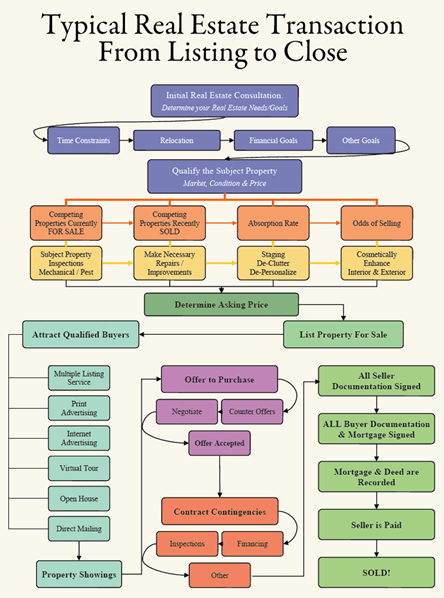I’ve worn a lot of professional hats over the years: Market maker, trader, investor, entrepreneur, residential real estate brokerage CEO and owner, agent, escrow-company owner, venture capitalist and more.
And over the years, I’ve also attended conferences organized by major players in the real estate industry: Recently, one that was organized by
Inman, the industry’s leading news source, and just a couple of weeks ago the
National Association of Realtors® (NAR) — the quintessential trade association for agents and brokers — held a meeting for technology companies (and I’m heading to another NAR conference next week).
And although there were a lot of important and impressive ideas discussed, I still left these conferences feeling like we didn’t quite hit the nails on their heads.
That got me thinking about where I see things today, including
the implosion of Zillow, and where I see them going — and, importantly, how these challenges and changes may impact not only industry professionals but everyday buyers and sellers, too.
Here are my predictions.
- Blockchain: The biggest tech change since digital MLS
Industry impact: Right now, there are
very few residential real estate transactions taking place via blockchain and those that tend to be higher in price:
Take a look at this example in Miami, in which a $28 million penthouse purchase was completed, start to finish, in 10 days. That’s about a month less than a traditional transaction would have taken in Miami and when it expands across states like New York (and others that have incredibly clunky processes in place, resulting in transactions that take 8-12 weeks to close) the impacts will be industry-altering.
And even as a crypto-denier, I have to admit (and embrace?!?) the potential for blockchain to revolutionize real estate. To reach its full potential, though, means that we’ll need changes in banking regulations and more. Still, the technology is just about there and it’s only a matter of time before blockchain is more broadly adopted.
Everyday buyer and seller impact: The impact of blockchain technology (and with it, crypto) on everyday residential real estate buyers and sellers — and everyone else in the industry — has the potential to be significant. In addition to the time and cost savings of greater efficiency, blockchain can ultimately lead to safer transactions — safer data, safer documentation, safer transfer of funds, and more title security.
And with the entire process streamlined, a tremendous amount of the transactional stress and expense will be alleviated — and it may even become fun!

- Pricing/valuation: The Zillow implosion shines a light on major weakness
Industry impact: Over the last 18 months or so that I’ve been writing this blog, if you’ve been in the camp that thought my emphasis on the importance of property valuation and pricing was possibly a bit overblown, then let me provide you with
a quote from Zillow co-founder and CEO Rich Barton:
“We’ve determined the unpredictability in forecasting home prices far exceeds what we anticipated and continuing to scale Zillow Offers would result in too much earnings and balance-sheet volatility.”
Zillow — arguably the industry leader with its digital assets, its Zestimates and its ibuying — now finds itself getting out of the home-flipping business, with losses of more than $550 million on its ibuying program and layoffs loom for 25% of its staff.
That’s one heck of a miscalculation and it reveals the leading systemic flaw in residential real estate.
Zillow Group Inc. is calling it quits on the home-flipping business, while disclosing expected losses of more than $550 million on homes purchased in the second half of this year for which the company admits it paid too much.
The real-estate giant on Tuesday blamed a faulty algorithmic model for ditching its iBuying business of buying and selling homes quickly, and said it will lay off about a quarter of its staff. The surprising exit, announced with pedestrian quarterly profits, thrashed shares in another rough trading session Tuesday, a day after
an analyst said two-thirds of the homes it bought are underwater.
Friends, I say every day to anyone who will listen, “pricing, pricing, pricing.” That Zillow completely overshot during the hottest time in residential real estate is proof that anyone can make mistakes, even them, even you and me. Their model broke down spectacularly quickly.
Perhaps a Warren Buffet-style buy-and-hold strategy would have better outcomes?
Everyday buyer and seller impacts: What makes this Zillow pill difficult to swallow for so many people is that thousands of buyers relied on Zestimates to determine whether they were getting decent prices, even knowing that housing in essentially all markets had blown up this last decade and the last couple of years, in particular.
And this is why we’re working hard at
Plunk to provide agents and their clients with better information — information that uses real-time data and AI to generate prices that more accurately reflect the market in the moment, not months ago. Eventually, data will be available that includes not just what similar-ish homes sold for at some point but, rather, much more specific and a nuanced valuation that includes everything from the neighborhood, square footage, beds and baths to specific materials and finishes, amenities, location on a street, crime stats and more.
I say this not just to shamelessly plug Plunk, but to highlight just how real this industry problem is today and how necessary our technology is, whether you’re an everyday seller or buyer or a multi-billion dollar corporate conglomerate.
Another way in which buyers and sellers could benefit? More accurate pricing, coupled with easier, faster and less costly transactions, means that people may move more often, creating more flow in inventory.
- Agents: The best will flourish, the rest will fade
Industry impact: Real estate agents are a funny group. While every industry and organization has its stars and laggards, there’s probably no industry in which (in any given market) the gap between the top producers and the rest is so staggering.
Top agents are outstanding salespeople, of course, but they’re also excellent marketers and at times, quasi-therapists to their buyers and sellers, too. They’re extremely knowledgeable about the nuances of the homes they represent and the locations and in this time when data is lagging, the best agents also function as underwriters, of sorts, because they’re often more knowledgeable than anyone or anything else, including any existing database.
For these reasons and more, I think we’ll see more independence among top-producing agents as technology and improved transactional processes enable them to break away from traditional brokerages. (I also think brokerages will look for solid ROI for their agents and rather than let many hang out then fade away, brokers will cut ties quicker.)
Everyday buyer and seller impacts: With more information available online and streamlining of transactions (eventually), it would seem that the role of the agent may be diminished — and that may be true for the bulk of them. But for the best agents, when they can spend less time on nonsense and more time with clients, they’ll shine even brighter and the buyers and sellers who contract their services will reap rewards, too.
- Brokerages: More targeted marketing, more transparent transactions
Industry impact: As technology evolves and real-time property data expands, I believe the brokerages that optimize everything from sales to targeted marketing will realize the most benefit, at extreme detriment to the rest. Another important evolution that’s necessary in the industry and particularly to brokerages is that they need to find a better way to recognize and reward top salespeople. The answer isn’t to bring them in to train and manage others — they need to be able to do their best in their chosen areas and brokers need to find ways to leverage that to keep them happy.
Everyday buyer and seller impacts: State-of-the-art digital marketing means less time wasted for both sellers and buyers. More transparency throughout the transaction process will also be a big benefit, especially for buyers.
The one thing that won’t change: People always need homes
People will always need somewhere to live — everything else is up for grabs. For those businesses and people who are on the cutting edge of residential real estate and who read the tape to stay aware of fluctuations and volatility and can ride that out, demand is never-ending and the future is bright.









